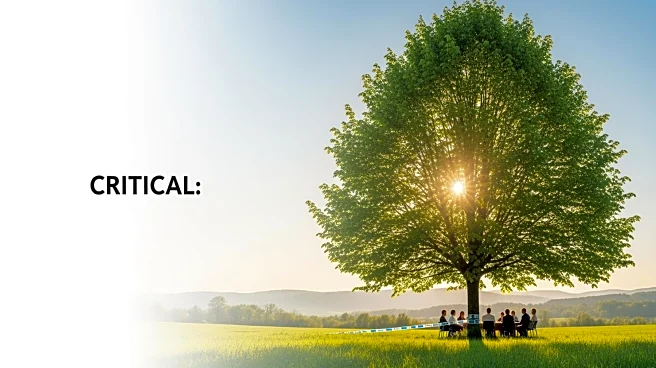What's Happening?
The United Nations Climate Change Conference (COP30) in Brazil has become a focal point for global climate discussions, with Texas Impact/Texas Interfaith Power & Light actively participating. The organization
is sending video dispatches from the conference, highlighting the Talanoa dialogue—a structured conversation aimed at fostering empathy and understanding among participants. This dialogue, rooted in Pacific Island traditions, encourages storytelling without concealment, allowing participants to share personal experiences and identify common goals. The event, held at the Lutheran Church of Belém, included music, reflection, and prayer, followed by group discussions. Key themes emerged, emphasizing the importance of indigenous contributions to environmental justice and the potential exploitation risks associated with energy transitions.
Why It's Important?
The discussions at COP30 underscore the critical role of indigenous wisdom in addressing environmental challenges, particularly in the Amazon Rainforest. Indigenous peoples have long advocated against mining and deforestation, offering valuable insights into sustainable living. The conference also highlighted the potential injustices of energy transitions, as seen in the Democratic Republic of the Congo, where cobalt mining has led to severe health issues. The call for a spiritual change in climate action reflects a need for collective sacrifice and community-mindedness, challenging the consumerism and individualism prevalent in the U.S. This approach could foster more effective climate policies and actions.
What's Next?
Participants at COP30 are expected to continue exploring strategies for integrating indigenous knowledge into global climate policies. The emphasis on spiritual change and community action may influence future climate initiatives, encouraging a shift from individualistic approaches to more collective efforts. Texas Impact's involvement suggests ongoing advocacy for policy changes that prioritize environmental justice and equitable energy transitions. The outcomes of these discussions could shape future international climate agreements and domestic policies in the U.S., promoting a more holistic approach to climate action.
Beyond the Headlines
The Talanoa dialogue at COP30 highlights the ethical dimensions of climate action, emphasizing the need for empathy and understanding in policy-making. The focus on spiritual change challenges the dominant narratives of consumerism, advocating for a more interconnected and community-focused approach. This shift could lead to long-term cultural changes, fostering a deeper commitment to environmental stewardship and social justice. The conference serves as a reminder of the interconnectedness of global communities and the shared responsibility in addressing climate change.










